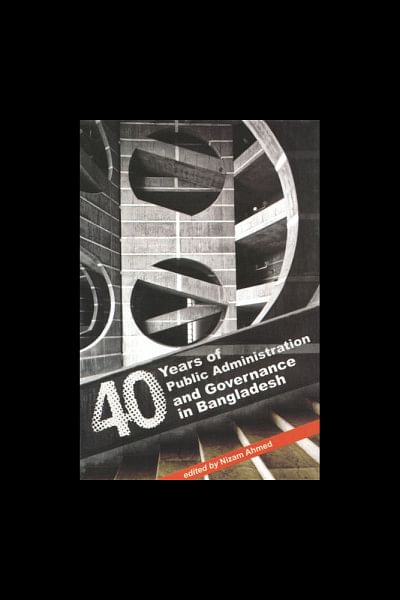40 Years of Public Administration and Governance in Bangladesh
Reviewer Shakhawat Liton while going through the book wonders why public servants do not serve the public?
EXPERTS in an authoritative book explores many aspects of the bureaucracy and offers food for thoughts to address the crisis in the administration. The authoritarian regimes even were better to some extent for the country's public administration than the democratic rule for last two decades. It may sound ridiculous. But a recently published book based on extensive research by more than a dozen of experts on public administration has come up with the astounding findings. Meaning of the findings is so unpleasant. The public administration was abused in different ways during the one party system rule till the middle of August, 1975 and the authoritarian and two martial law regimes until 1990. The martial law regimes and semi-martial law rulers in between August 1975 and December 1990 have abused the public administration to consolidate their power base. However, the martial law regimes could not behave ruthlessly with the administration as the regimes suffered from legitimacy crisis and they needed support from the public administration to rule the country.
Unfortunately, the research findings show how both Awami League and BNP are engaged in devising new ways of politicizing the bureaucracy for their partisan purposes for over the last two decades. The democratic rulers coming after the fall of autocratic Ershad regime in December 1990 could not deliver on their promises to offer good governance by refraining from abusing the public administration. One of their dominant strategies in the pervasive culture was to punish the disloyal civil servants and reward the ones who are loyal to the partisan politics. According to the findings, both the parties when in power have adopted this strategy in more aggressive manner during the decades of democratic rule than under authoritarian regimes. Relying on the findings in the book, it may be argued that country's two major political parties--AL and BNP that have been ruling and governing the country over the past two decades must shoulder the maximum responsibility for the present worse state of the public administration.

The authoritative book styled "40 Years of Public Administration and Governance in Bangladesh" offers many foods for thoughts. The book edited by Professor Nizam Ahmed, a teacher of Public Administration at the Chittagong University, explores many aspects of public administration and governance in our country. It also offers some good international practices which Bangladesh may follow to overcome the existing disastrous situation in the public administration.
The book shows the extent of politicisation that has taken place in the bureaucracy. It provides evidence to show that politicisation is noticed at every stage--recruitment, promotion and training of members of the bureaucracy. Several mechanisms have been used to ensure the primacy of party politics in personnel management matters.
The excessive politicisation of bureaucracy keeps producing dangerous consequences. The institutional capacity of the bureaucracy to govern has gradually declined. The research findings of the book say the government remains mostly unaccountable. MPs routinely utilise various techniques to hold the government accountable, although without much success. Those owning their elevation to political leaders remain busy satisfying personal/political need of their mentors rather than serving the public interest as a whole. The issue of accountability and transparency remains neglected. The government is struggling to deliver on its electoral promises as the excessive politicised administration appears unable to discharge neutrally their jobs. Public servants can not serve people according to their constitutional obligation to do so.
The present sorry state of the administration completely mocks the government's vision and mission stipulated in the official website of the Ministry of Public Administration. The public administration ministry envisions to become a key provider of high quality organizational, functional and human resource support to Bangladesh public service with a view to ensuring efficient, professional, transparent and responsive public service delivery. About its mission the ministry claims that "it contributes to the development of a competent and accountable public service system by attracting, developing, engaging and managing an efficient and innovative organizational, functional human resources support system".
Unfortunately, the vision and mission expressed in words remain only in paper. Is the current public administration fit for independent Bangladesh and its people? One may draw an analogy between the public administration now exists in Bangladesh and that one existed during the British colonial rule. The British had laid the foundation of a modern public administration. But it was established more to help stabilize colonial rule than to serve the common interest. Whom does our present public administration serve more--people or the party in power?

 For all latest news, follow The Daily Star's Google News channel.
For all latest news, follow The Daily Star's Google News channel. 



Comments